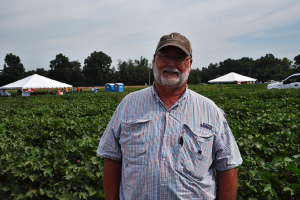 Cotton growers attending the Milan No-Till Field Day this year heard a clear message from University of Arkansas Extension Entomologist Gus Lorenz when it comes to choosing cotton varieties.
Cotton growers attending the Milan No-Till Field Day this year heard a clear message from University of Arkansas Extension Entomologist Gus Lorenz when it comes to choosing cotton varieties.
“That technology with three genes is going to keep us away from having to make foliar applications,” said Lorenz. “If we’re going to pay for the technology, let’s pay for a technology that works for us.”
Lorenz said dual gene cotton is not holding up for growers in southern Arkansas, where they have experienced a tremendous battle with bollworms during the 2018 growing season. That’s triggering the need for foliar applications to fight the possibility of yield damage. Lorenz said the problem is now moving beyond southern Arkansas to the central and northern parts of the state, and the bollworms are also affecting soybeans and other crops. He’s hopeful new chemistries currently in the pipeline will eventually provide more opportunities for control.
“There’s hope. We’re not giving up the ship or anything like that. We’re going to keep battling, but there’s some help on the horizon,” he said.
In the meantime, Lorenz encouraged growers to choose wisely when it comes to cotton varieties and to continue tank mixing and rotating chemistries to fight resistance and maintain yield potential.
Listen to Chuck’s interview with Gus Lorenz here: Interview with Gus Lorenz, University of Arkansas Extension
